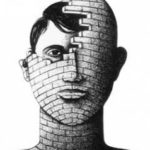
I wanted to add to what I wrote previously these few thoughts.Up to this point all I have written is a summary of all that happened, a telling of the tale narrated by my husband and a few of my own thoughts, but I haven’t really managed to achieve one of the main purposes of this story.
One purpose, as well as telling the story so it be known, as well as the acknowledgements, as well as the catharsis of the telling in itself, the cleansing by emptying myself of all this, was that my tale should be of use to others. I don’t really know how to achieve this but I think I might be able to do so by simply exposing all and letting others see that they are not alone. As I said; I suffered, I got through it and I am still here. Funnily enough, I am now stronger than ever. My attitude toward all this is helping me and the illness, terrible as it is (there is no pain but people don’t understand it, I have other problems) has given me a certain ability. It has taken away, but, at the same time, it has given me much. I have always been a positive person, but this has given me not just material things, like more time, but a defiant attitude towards life. I am conscious of one all- important thing; that I have not lost the most precious gift – life itself. Never more shall I take it for granted. This has taught me the greatest lesson of them all, to give thanks and really appreciate what I have. To take nothing for granted. For life is a gift and should be seen as such.
All that I had written here previous to these words was shortly after coming back home. Each day that goes by I read, I learn, I teach myself, and now I know many things I didn’t know before. “Before” is when I came back home after the hemorrhage, but “before” also means prior to the illness. I have read about this malady and now understand things which I didn’t understand before. I now know things which nobody told me and which I found out, eager as I am always to learn. Of course the only way to learn things is if you are given an answer to your questions. -But if you don’t know who or what to ask? Let this, then, serve as a manual of sorts for those who ask themselves questions as I did.
I did say, when I wrote the epilogue, that I was aware that I had to be done with this. So I have, the process ended but I wanted to add these words so the evolution should be seen. As in many other cases, one never finishes the evolution, there is always change. It is months now since I came back and I wanted to define my situation.
I have noticed that as I get better – I know this is so because others tell me –I, personally, perceive myself as worse. I would define this illness as kind (for it hides itself from the person) and at the same time a pain in the neck (for as you get better your perception is telling you otherwise). Subsequently I have read about this and it seems it is frequent in people who have suffered damage in their frontal lobe. This damage causes ignorance as to the understanding or acceptance of one’s situation. It’s funny, because it has its scientific name and is officially written about and I knew there was something not entirely right, but now I am happy because the fact that I am aware of what I wasn’t aware before, or of what I couldn’t see before, must mean that I am getting better. Now (I think) that what I perceive is the truth. Nobody has explained this to me, I have worked it out by myself. That, in itself, tells me that at least my mind is working.
When you really are ill your consciousness doesn’t allow you to appreciate/ to evaluate/ to fully understand your situation. Then, when you improve, when you get better, you realize how unwell you really are. Your improved perception allows you to see the truth. So, if you are now in this condition, how were you before? I actually talked to someone about this and I said that I was unaware, when I came back from hospital, that I was in the state I was.
I have read about a condition called “anosognosia” which affects those who have had damage in their frontal lobe due to a stroke or similar. It makes them unaware of their real situation. I’m talking of this as if it were about others but I presume I have found myself in such a situation. I think that the best way to overcome this is by making the patient face the situation. It’s hard and may depend on the patient, but it’s like getting over an addiction. First we must face the truth, diagnose and then, only then, cure.
Yolanda Canales
